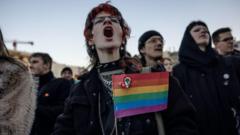Hungary's parliament, dominated by Prime Minister Viktor Orban's right-wing Fidesz party, has enacted a new law prohibiting LGBTQ+ Pride marches, framing it as a protective measure for children. This decision has incited protests, widespread condemnation from human rights organizations, and a rallying cry for LGBTQ+ rights across the continent, placing Hungary at the center of an escalating conflict over LGBTQ+ rights in Europe.
Hungary Implements New Law Banning LGBTQ+ Pride Marches

Hungary Implements New Law Banning LGBTQ+ Pride Marches
The recent legislation, swiftly passed by the Hungarian parliament, bans Pride marches and has ignited significant backlash across Europe and beyond.
The Hungarian parliament recently approved a controversial law that effectively bans LGBTQ+ Pride marches, a move met with fierce opposition both domestically and internationally. The ruling Fidesz party, led by Prime Minister Viktor Orban, expedited the bill's processing, which has drawn protests and vocal criticism from various organizations advocating for LGBTQ+ rights.
During the parliamentary session, opposition lawmakers expressed their dissent by lighting flares, while demonstrators took to the streets to block a key bridge in Budapest, demanding the preservation of the right to assembly as a fundamental civil right. The new legislation aligns with previous actions by Orban's government, including the abolition of legal recognition for transgender individuals in 2020 and a law restricting depictions of homosexuality to minors in 2021.
Under the newly enacted law, any assembly that contravenes these earlier restrictions could result in fines of up to 500 euros, alongside provisions allowing law enforcement to employ facial recognition technology to identify participants. Additionally, the parliament modified Hungary's assembly rights to specify that events must "respect the right of children to proper physical, mental, and moral development." This change reflects ongoing accusations, lacking substantive evidence, from the law’s supporters that pride marches pose a danger to minors.
Protesters, standing firm against the legislation, have coined slogans like "This is not child protection, this is fascism," reflecting a growing frustration among LGBTQ+ advocates regarding the encroachment upon civil liberties. European Union's equality representatives voiced their concerns, insisting that freedom of association and self-expression are integral rights that must be upheld for all citizens within member states.
The organizers of the upcoming Budapest Pride are vowing to persist with their planned event in June, amidst growing oppression and challenges to their rights. As the political landscape shifts with rising competition from the newly formed center-right Tisza party, which advocates for improved relations with the EU, the ongoing government crackdown on dissent and minority rights presents an increasingly complex tableau of power and resistance in Hungary.
In the face of these developments, the international community continues to scrutinize Hungary’s treatment of its LGBTQ+ population, raising vital questions about the balance between national governance and human rights obligations in an era of rising populism and conservative ideologies.
During the parliamentary session, opposition lawmakers expressed their dissent by lighting flares, while demonstrators took to the streets to block a key bridge in Budapest, demanding the preservation of the right to assembly as a fundamental civil right. The new legislation aligns with previous actions by Orban's government, including the abolition of legal recognition for transgender individuals in 2020 and a law restricting depictions of homosexuality to minors in 2021.
Under the newly enacted law, any assembly that contravenes these earlier restrictions could result in fines of up to 500 euros, alongside provisions allowing law enforcement to employ facial recognition technology to identify participants. Additionally, the parliament modified Hungary's assembly rights to specify that events must "respect the right of children to proper physical, mental, and moral development." This change reflects ongoing accusations, lacking substantive evidence, from the law’s supporters that pride marches pose a danger to minors.
Protesters, standing firm against the legislation, have coined slogans like "This is not child protection, this is fascism," reflecting a growing frustration among LGBTQ+ advocates regarding the encroachment upon civil liberties. European Union's equality representatives voiced their concerns, insisting that freedom of association and self-expression are integral rights that must be upheld for all citizens within member states.
The organizers of the upcoming Budapest Pride are vowing to persist with their planned event in June, amidst growing oppression and challenges to their rights. As the political landscape shifts with rising competition from the newly formed center-right Tisza party, which advocates for improved relations with the EU, the ongoing government crackdown on dissent and minority rights presents an increasingly complex tableau of power and resistance in Hungary.
In the face of these developments, the international community continues to scrutinize Hungary’s treatment of its LGBTQ+ population, raising vital questions about the balance between national governance and human rights obligations in an era of rising populism and conservative ideologies.






















